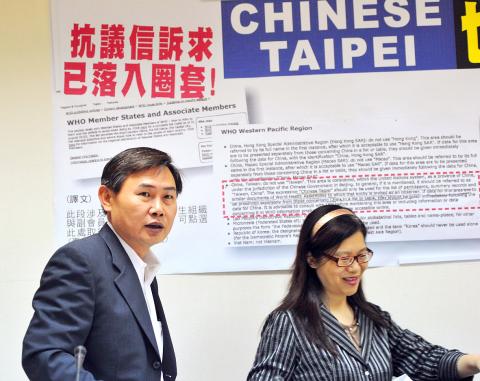The WHO has not wavered on its position that Taiwan is a part of China despite extending an invitation to the Department of Health under the designation “Chinese Taipei,” new information from the WHO reveals.
The stance, already evident from a leaked internal WHO memo released by Democratic Progressive Party (DPP) Legislator Kuan Bi-ling (管碧玲) last week, was strengthened by the new disclosure yesterday of the organization’s internal publishing policies that state Taiwan is “a province of China.”
“This area is considered, within the United Nations system, as a province of China under the jurisdiction of the Chinese government in Beijing,” the memo says, expressly forbidding WHO staff from simply using the term “Taiwan.”

Photo: CNA
The words “Chinese Taipei” should only be used for “a list of participants, summary records and similar documents of World Health Assemblies to which that entity is invited as an observer.”
Kuan said the information was further evidence that Taiwan’s breakthrough in attending the World Health Assembly (WHA) for the third year running has come at a hefty price.
Meant for WHO staff, the information is part of an internal Web site that informs officials on the “WHO house style” as part of the organization’s publishing policies. The Web page, which directs questions to the WHO’s legal team, was leaked by a source within the WHO, Kuan said.
The page was last updated on Feb. 23 this year, five months after senior WHO officials sent out a confidential memo asking agencies to be expressly aware that Taiwan is a “province of China,” pursuant to a prior closed-door arrangement with Beijing, Kuan said.
“The WHO controversy shows that Taiwan’s legal status is being eroded even as the governing party continues to mislead the [public] by playing games with our name,” Kuan said. “Taiwan’s sovereignty is being sold out — that’s an unavoidable and undeniable fact.”
Taiwan’s delegation to the WHA has formally protested about being lumped together with China, writing to WHO Secretary-General Margaret Chan (陳馮富珍) on Monday that its internal designation of “Taiwan, China” is a “mistake” and “absolutely unacceptable.”
The DPP labeled the protest “weak,” arguing that the controversy seriously undermines the nation’s international standing.
Chinese Taipei — Taiwan’s designation in most international organizations, including at the Olympic Games — has never before been seen as part of China, as the WHO information made clear, DPP lawmakers said.
The lawmakers have called for a boycott of the meeting that opened on Monday.
“Without adequately expressing our protest, I don’t feel that there is a way that Taiwan can attend the WHA,” DPP Legislator Lee Chun-yee (李俊毅) said. “What that would show is that we have completely given up on Taiwan’s sovereignty.”
Chinese Nationalist Party (KMT) lawmakers have called the DPP’s remarks “election rhetoric,” pointing out that the government has to keep in mind long-term interests when protesting the memo.
“I don’t think that getting angry is what the public expects the government to do,” KMT Legislator Lin Yi-shih (林益世) said. “Everybody must work together to think of ways to make this country better, instead of continuing with election ploys.”

Seventy percent of middle and elementary schools now conduct English classes entirely in English, the Ministry of Education said, as it encourages schools nationwide to adopt this practice Minister of Education (MOE) Cheng Ying-yao (鄭英耀) is scheduled to present a report on the government’s bilingual education policy to the Legislative Yuan’s Education and Culture Committee today. The report would outline strategies aimed at expanding access to education, reducing regional disparities and improving talent cultivation. Implementation of bilingual education policies has varied across local governments, occasionally drawing public criticism. For example, some schools have required teachers of non-English subjects to pass English proficiency

‘FORM OF PROTEST’: The German Institute Taipei said it was ‘shocked’ to see Nazi symbolism used in connection with political aims as it condemned the incident Sung Chien-liang (宋建樑), who led efforts to recall Democratic Progressive Party (DPP) Legislator Lee Kun-cheng (李坤城), was released on bail of NT$80,000 yesterday amid an outcry over a Nazi armband he wore to questioning the night before. Sung arrived at the New Taipei City District Prosecutors’ Office for questioning in a recall petition forgery case on Tuesday night wearing a red armband bearing a swastika, carrying a copy of Adolf Hitler’s Mein Kampf and giving a Nazi salute. Sung left the building at 1:15am without the armband and apparently covering the book with a coat. This is a serious international scandal and Chinese

TRADE: The premier pledged safeguards on ‘Made in Taiwan’ labeling, anti-dumping measures and stricter export controls to strengthen its position in trade talks Products labeled “made in Taiwan” must be genuinely made in Taiwan, Premier Cho Jung-tai (卓榮泰) said yesterday, vowing to enforce strict safeguards against “origin laundering” and initiate anti-dumping investigations to prevent China dumping its products in Taiwan. Cho made the remarks in a discussion session with representatives from industries in Kaohsiung. In response to the US government’s recent announcement of “reciprocal” tariffs on its trading partners, President William Lai (賴清德) and Cho last week began a series of consultations with industry leaders nationwide to gather feedback and address concerns. Taiwanese and US officials held a videoconference on Friday evening to discuss the

PERSONAL DATA: The implicated KMT members allegedly compiled their petitions by copying names from party lists without the consent of the people concerned Judicial authorities searched six locations yesterday and questioned six people, including one elderly Chinese Nationalist Party (KMT) member and five KMT Youth League associates, about alleged signature forgery and fraud relating to their recall efforts against two Democratic Progressive Party (DPP) legislators. After launching a probe into alleged signature forgery and related fraud in the KMT’s recall effort, prosecutors received a number of complaints, including about one petition that had 1,748 signatures of voters whose family members said they had already passed away, and also voters who said they did not approve the use of their name, Taipei Deputy Chief Prosecutor